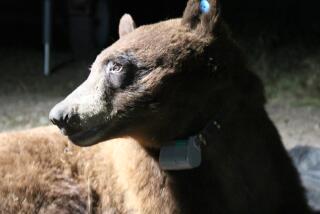Case of Dancing Bear Raises Cruelty Issue
- Share via
NEW DELHI — Nasser Khan, a 70-year-old animal trainer, squatted beside his mud-brick home and bitterly recalled the day environmental authorities confiscated Munna, the dancing bear.
Khan was about to begin a sidewalk show in front of a movie theater and Munna was ready to entertain--playing the guitar, smoking cigarettes and disco dancing. Then the authorities showed up, accused Khan of mistreating the bear and took Munna to the zoo.
“Without giving me any notice, they snatched my bear,” Khan said. “I asked them: ‘Don’t take away my bear. This is my livelihood. This is my family’s source of income. My whole family depends on this bear.’ ”
Khan, a slender man with a lined face and a gray handlebar mustache, ran afoul of a growing animal rights and environmental awareness in India whose leading proponent is Maneka Gandhi, the minister of state for the environment.
Gandhi is the renegade daughter-in-law and sister-in-law, respectively, of former Prime Ministers Indira and Rajiv Gandhi. Estranged from the family and its traditional power base in the Congress (I) Party, she bolted and accepted a job with the new National Front government.
Since being named to the Cabinet-level post last fall, Gandhi has been a tireless advocate for the environment, calling for protection of wildlife and pressing for economic growth that will preserve the nation’s natural resources.
She has paid special attention to the treatment of animals, pushing for improved care of wildlife at the New Delhi zoo and urging the local humane society to remain open 24 hours a day because of the number of animals injured by cars at night.
During a recent visit to an animal shelter run by the Society for the Prevention of Cruelty to Animals, she stopped to look at a cow that had been hit by a car while wandering down a busy city street--a common sight in the capital.
The Times of India, which reported on the visit, said one of the officials noticed Gandhi looking at the cow and remarked, “Too many stray animals on the road.”
“No, no,” she replied. “Too much traffic.”
Such remarks, while perhaps intended to force people to think differently about the environment, have earned Gandhi a reputation for being cold and indifferent to the needs of her countrymen, who suffer from widespread poverty and unemployment.
And people like Nasser Khan, who lives in a slum of ramshackle huts crisscrossed by open sewers, wonder why an environmental crusade has to include a pet bear that provides an income for a large family.
“We don’t know why they took Munna. We don’t know if they are planning to save wildlife. We can’t tell you anything about that,” Khan said. “For us this is a question of bread and butter. This has been our business for generations. We don’t have anything else but our bear.”
But for officials who deal with the nation’s wildlife, the issues are clear. Munna is a sloth bear, an endangered species protected by law. Most likely, they say, he was illegally taken from the wild.
There are only about 500 sloth bears left in the wild in India, living in jungles and feeding on ants, roots and fruits. Fully grown, they can reach a height of about 5 1/2 feet standing on their hind legs and can weigh up to 400 pounds.
The confiscation of Munna on May 1 sparked a controversy in India, where thousands of snake charmers and other street performers scratch out a living by training animals, birds and reptiles to perform for tourists.
Many performers with trained bears fled the city after Munna’s arrest, while others with bears, monkeys, snakes and birds stayed behind and staged protests in front of Parliament. Khan filed a case in the country’s High Court seeking the bear’s return.
But environmental authorities say the bear should not be returned because it has been mistreated. A zoo official said when Munna arrived, his claws had been cut and he had a cataract that left him blind in one eye.
“This poor fellow can’t eat,” added the official, who asked not to be identified. He said all of Munna’s teeth except for the molars had been removed, leaving him unable to eat anything but a mixture of milk and bread.
In addition, a hole had been gouged through the bear’s nose.
“That’s the place where they pass a rope. That’s so they can control it,” the zoo official said. “If you pull it, it is quite painful.”
“If that is not cruelty, I don’t know what is cruelty,” he added.
But Khan, who said he has been training animals all his life, denied he mistreated the bear. He said the family raised Munna from a cub and cared for the bear with love, even keeping him inside their tiny shack during the rainy season.
Squatting beside his shack, Khan said the struggle for control of Munna was more than a fight over a single bear. He said he was trying to preserve a way of life that is slowly dying in an age of television and videotape movies.
“This profession began at a time when there was no circus, cinema or drama,” he said. “My father, grandfather and great-grandfather carried on this profession.
“I want my bear. Otherwise, my family profession will end. Our tradition will end.”
More to Read
Sign up for Essential California
The most important California stories and recommendations in your inbox every morning.
You may occasionally receive promotional content from the Los Angeles Times.












